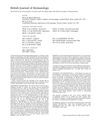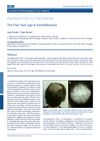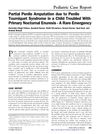 26 citations,
August 2014 in “PubMed”
26 citations,
August 2014 in “PubMed” Testosterone improves mood and thinking skills; finasteride has no effect.
 2 citations,
November 2020 in “Fertility Research and Practice”
2 citations,
November 2020 in “Fertility Research and Practice” The survey helps identify menstrual irregularities and excess male hormones, aiming to detect conditions like Polycystic Ovary Syndrome.
 November 2022 in “Journal of Investigative Dermatology”
November 2022 in “Journal of Investigative Dermatology” COVID-19 patients with hair loss experienced greater cognitive deficits and more symptoms of depression, anxiety, and stress.

COVID-19 patients with hair loss experienced more cognitive issues and these issues were linked to higher levels of depression, anxiety, and stress.
 August 2008 in “European Neuropsychopharmacology”
August 2008 in “European Neuropsychopharmacology” Some teenagers with anorexia nervosa have worse cognitive abilities, especially in visual and spatial tasks, and this is more common in those with a lower body weight.
 1 citations,
October 2023 in “The Journal of nutrition, health & aging”
1 citations,
October 2023 in “The Journal of nutrition, health & aging” Higher hair levels of zinc and chromium were linked to less cognitive decline in very old people.
 18 citations,
August 2019 in “Nutrients”
18 citations,
August 2019 in “Nutrients” Eating barley for life may lead to healthier aging in mice.
69 citations,
October 2013 in “Journal of Clinical Psychopharmacology” Naltrexone did not significantly reduce hair pulling but improved cognitive flexibility.
20 citations,
August 2015 in “Behaviour change” Cognitions significantly influence Trichotillomania, suggesting cognitive therapies could help.
 5 citations,
September 2021 in “Cureus”
5 citations,
September 2021 in “Cureus” Depression in women with Polycystic Ovarian Syndrome (PCOS) is linked to insulin resistance and hyperandrogenism, and managing these can help reduce depression. Lifestyle changes and Cognitive Behavioral Therapy can be effective treatments.
 2 citations,
January 2023 in “Journal of Education, Health and Sport”
2 citations,
January 2023 in “Journal of Education, Health and Sport” Cognitive-behavioral therapy with habit reversal training is the most effective treatment for trichotillomania.
 May 2024 in “Actas dermo-sifiliográficas/Actas dermo-sifiliográficas”
May 2024 in “Actas dermo-sifiliográficas/Actas dermo-sifiliográficas” Effective treatments for trichotillomania include cognitive-behavioral therapy, certain medications, and alternative support tools.
 June 2023 in “medRxiv (Cold Spring Harbor Laboratory)”
June 2023 in “medRxiv (Cold Spring Harbor Laboratory)” Nociplastic type pain, common in Chronic Overlapping Pain Conditions, is a complex, heritable trait linked to 24 unique genetic factors and 127 genes, with potential shared mechanisms in cognitive, personality, and metabolic traits.
 January 2023 in “Neuroscience applied”
January 2023 in “Neuroscience applied” People with an imbalance between their cognitive and emotional empathy have lower levels of the hormone oxytocin in their hair.
166 citations,
February 2005 in “Behavioural brain research” Vitamin D receptor knockout mice have significant motor impairments but no cognitive deficits.

Clinicians should look for skin issues, sleep problems, cognitive changes, and food cravings as signs of insulin resistance.
 451 citations,
March 2005 in “Endocrine Reviews”
451 citations,
March 2005 in “Endocrine Reviews” The enzyme steroid sulfatase is linked to breast cancer and other conditions, and inhibitors are being developed for treatment.
 138 citations,
March 2001 in “Clinics in Dermatology”
138 citations,
March 2001 in “Clinics in Dermatology” Hair loss can significantly affect a person's self-esteem and body image, especially in young people, those who value their looks highly, and women.
 128 citations,
September 2013 in “Journal of Clinical Epidemiology”
128 citations,
September 2013 in “Journal of Clinical Epidemiology” The conclusion is that the risk of losing significance in meta-analysis results increases with smaller effects and more missing data, and using the median standard deviation for imputation is recommended.
 18 citations,
November 2000 in “British Journal of Dermatology”
18 citations,
November 2000 in “British Journal of Dermatology” Many skin patients have mental health issues, so dermatologists should consider psychological care.
14 citations,
January 2020 in “Women's health reports” Iron deficiency in menstruating women causes many health issues beyond anemia and needs early detection and treatment.
 13 citations,
June 2012 in “Journal of Dermatological Case Reports”
13 citations,
June 2012 in “Journal of Dermatological Case Reports” An 8-year-old boy with hair-pulling disorder had a bald patch that was confirmed not to be a fungal infection and was treated with therapy.
8 citations,
November 2011 in “Journal of Medical Case Reports” Bupropion may help treat trichotillomania when fluoxetine doesn't work.
 6 citations,
January 2013 in “Urology”
6 citations,
January 2013 in “Urology” An 8-year-old boy with bed-wetting issues suffered a severe penile injury from tying a thread around his penis, requiring urgent medical treatment to avoid worse outcomes.
5 citations,
May 2015 in “JRSM open” If a child is losing a lot of eyelashes and it keeps happening, doctors should look carefully at their health history because it might be a sign of a different health problem.
 4 citations,
January 2019 in “Clinical and Experimental Dermatology”
4 citations,
January 2019 in “Clinical and Experimental Dermatology” The review found that individualized treatment and teamwork are important for trichotillomania, and patients who followed through with treatment often improved.
 3 citations,
March 2019 in “Post Reproductive Health”
3 citations,
March 2019 in “Post Reproductive Health” Testosterone replacement can help menopausal women with various symptoms, but should be used carefully and is not yet officially licensed in the UK for women.
 3 citations,
December 2001 in “Irish Journal of Psychological Medicine”
3 citations,
December 2001 in “Irish Journal of Psychological Medicine” Trichotillomania is a challenging-to-treat impulse-control disorder where individuals pull out their hair, more common in females, with some treatments showing benefits.
 2 citations,
June 2016 in “PubMed”
2 citations,
June 2016 in “PubMed” An 11-year-old girl with compulsive hair pulling was successfully treated with therapy and medication.
 2 citations,
July 2005 in “Baylor University Medical Center Proceedings”
2 citations,
July 2005 in “Baylor University Medical Center Proceedings” A 4-year-old girl was diagnosed with trichotillomania, a condition where she pulls out her hair, which may resolve on its own or require therapy.
























